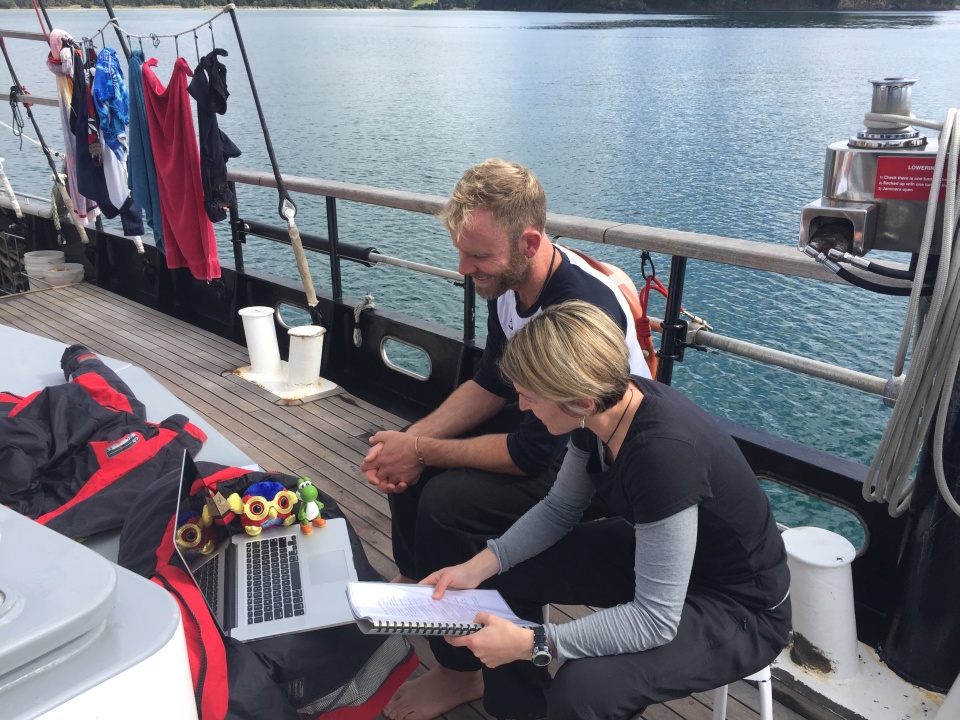Web conferences with schools are hosted live from the field by the LEARNZ Teacher and are coordinated by the LEARNZ Office. More about web conferences.
To book as a speaking school, email Shelley the LEARNZ Teacher shelley.hersey@core-ed.org.
| Web conference date |
Time |
Location; Where are you? |
Topic |
Experts |
Speaking Schools |
Recording |
| Tuesday 6 March |
9.15am |
Nelson |
The importance of marine ecosystems and how they work |
Sorrel O'Connell-Milne and Stina Kolodzey |
Titirangi School, Year 6 and Harewood School Year 5-6 (questions below) |
https://vimeo.com/258695005 (32 minutes - the password for accessing web conference recordings is in your teacher's MyLEARNZ) |
| Wednesday 7 March |
2pm |
Nelson |
Estuaries, human impacts and tipping points |
Rebecca Gladstone-Gallagher and Josie Crawshaw |
Red Beach School, Year 5-6 and Brooklyn School Year 5-6 (questions below) |
https://vimeo.com/258908125 (37 minutes - the password for accessing web conference recordings is in your teacher's MyLEARNZ) |
| Thursday 8 March |
9.15am |
Nelson |
Sustainable Seas Challenge and research |
Joe O'Callaghan |
Tamatea Intermediate School, Year 8 and Paraparaumu Beach School Year 5-6 (questions below) |
https://vimeo.com/259059858 (39 minutes - the password for accessing web conference recordings is in your teacher's MyLEARNZ) |
Questions for Web Conference 1
Questions from Titirangi School
- How do you know how many in a population like blue cod? How do you count them? FS
- Tell us about the life and habits of blue cod. We read it can change sex from female to male! JL
- Do you think anything is threatening the blue cod’s ecosystem? And what needs to be done? OF
- We learned about abiotic elements in an ecosystem. What are the abiotic elements in a marine ecosystem? How important is water temperature?
- In our background reading we had never heard of eutrophication. Can you explain it and is this a big problem in NZ, because we have a lot of farms?
Questions from Harewood School
- What is the most common sea creature found in Tasman Bay? Riley
- Who helps with the protection of the sea and how do they help? Angelo
- Are any sea creatures found in this area endangered, and what is causing them to become endangered? Stella
- Are scientists discovering any new species in this area? Ethan
- Are there any species unique to Tasman Bay that are not found anywhere else in the world? Isla
Questions for Web Conference 2
Questions from Red Beach School
- What impact are human's having on our marine environment?
- With an increase in housing and traffic, what impact does this have on our beaches and estuaries?
- What can we do to reduce our impact?
- How do you measure the impact we have on the marine environment?
- How has our impact changed over time? (over the past 100 years)
Questions from Brooklyn School
- How does the water temperature change when the river water hits the sea water in an estuary and how does that affect the animals living there? Jaymin
- Do organisms in estuaries travel? If so, how far and why? Amy
- What is the population of shellfish at a typical estuary? Ari
- We have had big changes in sea temperatures around New Zealand this year, how does that affect the sea life? Mere-Rangi
- I love to collect paua with my Dad, we have had a cyclone hit here which has caused lots of flooding, will the run off from that storm affect the marine environment? Reggie
Questions for Web Conference 3
Questions from Paraparaumu Beach School
- We read that there are 14 fiords in New Zealand. In our research we found out that fresh water can sit upon salt water. Is this correct and if so, how does this happen? Is this due to the density of salt water? Also, if this is true, how can different types of sea creatures live in fiords if they can’t adapt to different types of water?
- When we were doing our background reading on the LEARNZ website, we found out about ecosystems. Is there a large variety of ecosystems in the ocean? We understand that the Great Barrier Reef is an ecosystem. So we were wondering, are all ecosystems named?
- While researching we found information that we’re really interested in which is different threats to the ocean. Recently, on the news they have been talking about plastic pollution in the world’s oceans. Are plastic bags a big threat? or is global warming a bigger threat?
- What damage does carbon dioxide do to the ocean?
- We have read that seagrass beds are fragile habitats. Where in the ocean are seagrass beds found? Are seagrass beds an ecosystem and if so what types of sea creatures live in them?
Questions from Tamatea Intermediate School
- What is the biggest problem that is causing threats to New Zealand marine ecosystems? (James)
- What could we do now to help protect the sea and everything in it? (Alyse)
- How long would it take for the sea to get polluted completely if we keep going at this rate? (Justinna)
- What type of plants grow in the sea? (Zahara)
- What type of 'landscape' is on the sea bed? (Sasha)
